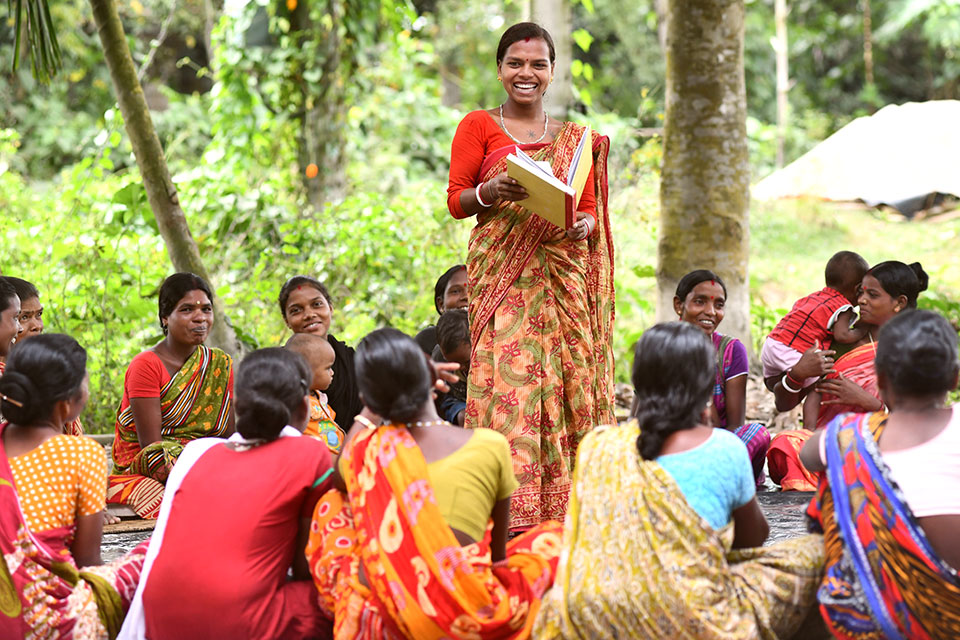In India, women boycott weddings with child brides
Across five rural Indian states, thousands of women have joined Women Peer Groups, which are using everything from protests to pledging ceremonies as part of a UN Trust Fund to End Violence against Women-supported violence-prevention programme for ethnic minority women.Date:

You could call 20-year-old Malti Tudu a wedding crasher. Only her goal is to stop the wedding from ever getting started.
At least when the bride-to-be is a child.
“If all people start boycotting such weddings, it would definitely help eliminate child marriage,” says Ms. Tudu, from Simalbari village, Kishanganj district, in India’s Bitar.[1] state. “People are needed during a marriage ceremony—a priest to perform the religious rites, musical band to play the music, cook to prepare the food for the guests, and guests to give their blessings to the newlyweds.”
Ms. Tudu, barely out of her teens at 20 years old herself, is one of the young women leaders from Bihar who are trying to stop child marriage in their communities.
In the officially categorized Santhal Scheduled caste and tribe (to which Ms. Tudu and the majority in her district belong), 74.1 per cent of women and girls are married before age 18, as opposed to 42.6 per cent from other communities.[2]
To prevent such weddings, Women’s Peer Group are drumming up support through meetings in which leaders ask participants to pledge that they wouldn’t have their daughters married underage—or attend such weddings. After the pledging ceremony, they lead rallies in their villages to spread awareness about the negative impacts of child marriage.
Globally, an estimated 650 million women and girls alive today were married before age 18. Child marriage often results in early pregnancy, interrupts schooling, limits girls’ opportunities and increases their risk of experiencing domestic violence.
Ms. Tudu doesn’t shy away from new tactics. Once even took a group of women to visit the parents of a 16-year-old girl whose marriage was being arranged.
“Her parents shouted at us, saying that they are in-charge of their daughter’s future… that they had done it before and the wedding was attended by many people,” she explains.
Faced with their resistance, Ms. Tudu and her group asked everyone they could in the village not to attend the wedding.
They returned to the girl’s house a second time with more village support, and spoke to her, discovering that she wanted to finish her studies. When the group checked in again a few weeks later, her parents had called off the marriage and the girl was continuing with her studies.
“I saved a life from getting destroyed,” says Ms. Tudu, proudly. “Sensitization is the key to reducing such cases.”
She says the training on psychosocial support she received from the local organization Pragya, helped her build her skills in counselling and fuel her activism. The initiative is funded by the UN Trust Fund to End Violence against Women (UN Trust Fund), managed by UN Women on behalf of the UN system.

Similar efforts are underway in the Lamba Basti village, also in Kishanganj district, led by 35-year-old Talamai Soren. Married at the age of 15 herself, she knows all too well the kind of risks involved. She believes emphasizing education for girls is a good way to reduce the risk of child marriage, and the efforts of the Women’s Peer Group have reduced it to a certain extent.
In Baliadhangi village, 21-year-old Niska Pushpa Marandi also talks to women about the legal implications of child marriage and dowry transactions, which is a criminal offence and carries a jail term. “After taking the oath, none of you will get your underage children married off and you must also never attend weddings where legally underaged people are getting married or people are accepting and offering dowry,” she urges people to promise.
These kinds of activities are being organized by the more than 2,800 rural women and girls who have joined the 100 Women Peer Groups set up across five Indian states (Rajasthan, Bihar, Jharkhand, Assam and Himachal Pradesh) as part of a comprehensive UN Trust Fund-supported violence prevention programme for ethnic minority women.

According to Lorna Mesina from the UN Trust Fund to End Violence against Women, “the Pragya project has a lot of local support and capitalizes on the strength of local community groups, like the village councils and women’s peer groups, which makes it sustainable.”
The programme uses awareness-raising and mobilization of the women and the community to act against violence. It also seeks to ensure more effective support services and responses, such as remedial counselling and legal and medical aid to survivors of violence.
Notes
[1] National Family Health Survey (2015-16)
[2] Mamta Health Institute for Mother and Child (2013)





